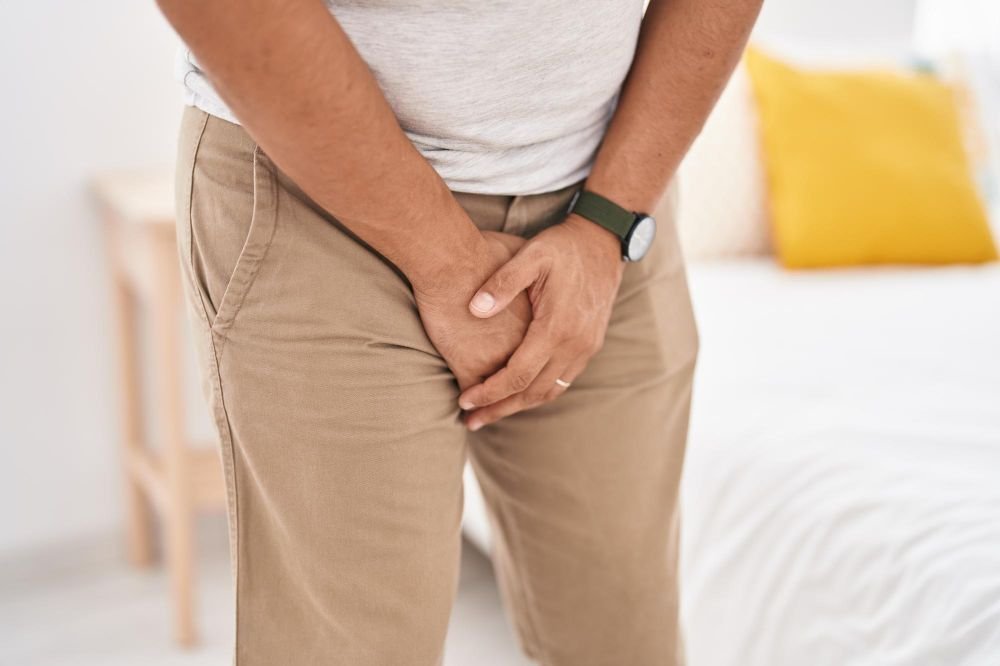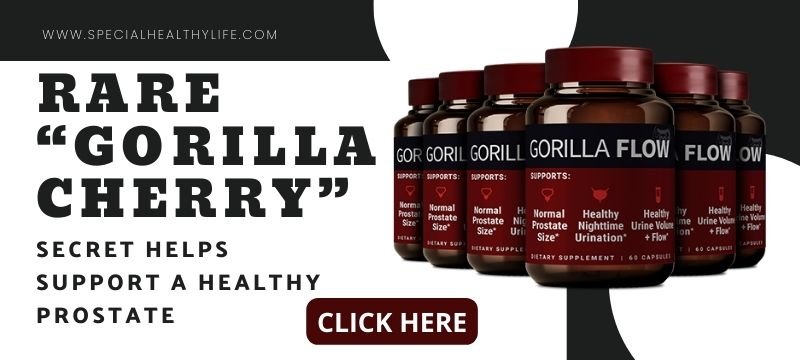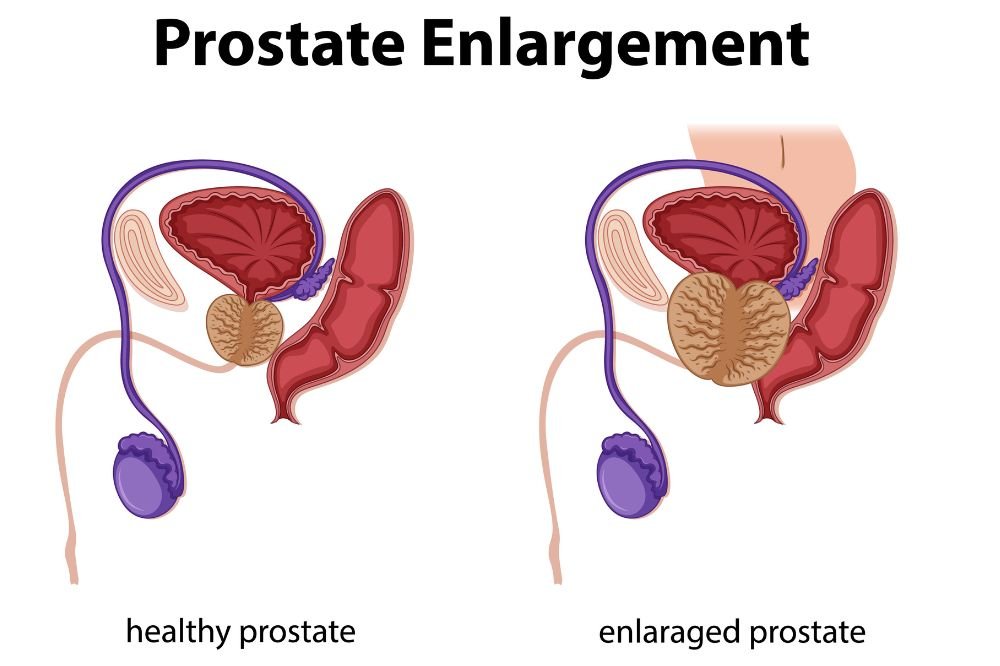Discover the Top Common Testicle Discomfort Causes – Your Comprehensive Guide to Understanding Testicular Pain.
Testicle discomfort, though often a sensitive subject, is a topic that deserves our attention.
It’s an issue that can affect men of all ages, causing pain, anxiety, and even potentially signaling underlying health problems.
Understanding the causes of testicle discomfort is of paramount importance, as it not only aids in its management but can also lead to early detection of serious conditions.
In this article, we will delve into the world of testicle discomfort causes, with a particular emphasis on one specific and surprisingly common factor: an enlarged prostate.
Testicle discomfort is a concern that many men may encounter at some point in their lives.
It can range from mild discomfort to severe pain, and it often prompts questions, concerns, and even fears.
While experiencing testicle discomfort can be distressing, it’s important to remember that it’s a symptom, not a condition in itself.
To effectively address this issue, we must first explore the various potential causes that lie beneath the surface.
Understanding the causes of testicle discomfort is akin to deciphering a puzzle.
Each piece of information we uncover brings us closer to a comprehensive solution.
Beyond the immediate relief it offers, this knowledge can also be a crucial indicator of one’s overall health.

One of the key aspects of this article is to shed light on a common yet often overlooked cause of testicle discomfort: an enlarged prostate.
Known medically as Benign Prostatic Hyperplasia (BPH), an enlarged prostate is a condition that predominantly affects older men but can also occur in younger individuals.
It is a condition where the prostate gland, a walnut-sized organ located just beneath the bladder, gradually increases in size.
The proximity of the prostate to the testicles is significant. It means that any changes or abnormalities in the prostate can have a direct impact on the surrounding structures, including the testicles.
This is a connection that many are unaware of, which is why it is vital to delve deeper into the relationship between an enlarged prostate and testicle discomfort.
This article aims to bridge that knowledge gap.
We will explore how an enlarged prostate can lead to testicle discomfort, examine the symptoms that individuals may experience, and discuss the diagnostic and treatment options available.
By the end of this article, you will have a better understanding of the interplay between these two aspects of male anatomy and be equipped with valuable information to address and manage testicle discomfort effectively.
It’s important to emphasize that while an enlarged prostate is one of the potential causes of testicle discomfort, it is not the sole cause.
There are numerous other factors, including infections, injuries, and medical conditions, that can contribute to testicle discomfort.
This article does not seek to overshadow these causes but rather to provide comprehensive insights into one of the most prevalent and treatable contributors to this issue.
As we embark on this journey of understanding the causes of testicle discomfort, with a spotlight on the role of an enlarged prostate, remember that knowledge is your greatest ally.
It empowers you to take control of your health, seek timely medical advice, and make informed decisions.
So, let’s begin our exploration into this important aspect of men’s health and unravel the mysteries of testicle discomfort causes.
Understanding Testicle Discomfort

Testicle discomfort is a term that encompasses a range of sensations, from a mild, persistent ache to sharp, intermittent pain in the testicles.
For many men, even the thought of such discomfort can elicit a sense of unease.
However, understanding what testicle discomfort is and its significance in the realm of men’s health is crucial.
At its core, testicle discomfort refers to any form of physical sensation or pain that affects one or both testicles, the paired male reproductive organs responsible for producing sperm and testosterone.
These vital structures are housed within the scrotum, a pouch-like sac that hangs outside the body.
The scrotum serves a crucial role in maintaining the optimal temperature for sperm production, slightly cooler than the body’s core temperature.
This unique anatomy also makes the testicles vulnerable to external factors and health issues.
The significance of testicle discomfort cannot be overstated.
While occasional mild discomfort may not raise immediate alarm, persistent or severe testicle pain should never be ignored.
The testicles are not only central to a man’s reproductive system but can also serve as indicators of his overall health.
Discomfort in this area can be a red flag, signaling a potential underlying issue that warrants prompt attention.
What makes testicle discomfort particularly concerning is that it can have a multitude of underlying causes.
It’s a symptom rather than a diagnosis in itself, and its origins can vary widely.
Understanding this complexity is essential for accurate diagnosis and appropriate treatment.
Some common causes of testicle discomfort include infections, such as epididymitis or orchitis, which result from inflammation of the epididymis or testicle, respectively.
These conditions can lead to pain, swelling, and discomfort in the affected testicle.
Injuries, such as trauma or torsion, can also trigger testicle discomfort.
Testicular torsion, in particular, is a medical emergency that occurs when the spermatic cord twists, cutting off blood flow to the testicle.
This condition demands immediate surgical intervention to save the testicle and relieve pain.
Furthermore, medical conditions like kidney stones or hernias can cause referred pain to the testicles.
This means that even though the testicles themselves may be healthy, discomfort in this area may be a symptom of an issue elsewhere in the body.
It’s important to recognize that psychological factors, including stress and anxiety, can also manifest as physical discomfort, including testicle pain.
This mind-body connection underscores the need for a holistic approach to diagnosing and managing testicle discomfort.
In this comprehensive exploration of testicle discomfort, we’ll not only delve into the various potential causes but also provide insights into specific triggers and contributing factors.
One key focus will be the often-overlooked but significant connection between an enlarged prostate and testicle discomfort, a topic that will be explored in-depth in subsequent sections of this article.
Ultimately, understanding testicle discomfort is the first step towards effectively addressing it.
By recognizing its significance and acknowledging the multitude of potential causes, individuals can take a proactive approach to their health.
Whether it’s seeking medical advice, adopting lifestyle changes, or learning about available treatments, knowledge empowers individuals to make informed decisions regarding their well-being.
As we continue our journey into the causes of testicle discomfort, you’ll gain a deeper insight into the factors that can contribute to this condition and how to navigate them effectively.
Overview of Testicle Discomfort Causes
To navigate the world of testicle discomfort effectively, it’s crucial to embark on a journey through its various potential causes.
Understanding these common triggers is paramount for both individuals experiencing discomfort and the healthcare professionals tasked with diagnosing and treating these issues.
In this section, we’ll provide an overview of the common causes of testicle discomfort and underscore the importance of identifying the underlying cause for proper treatment.

Infections – Common Testicle Discomfort Causes
Infections are among the most prevalent causes of testicle discomfort.
Epididymitis, characterized by inflammation of the epididymis (a coiled tube located behind the testicle), and orchitis, inflammation of the testicle itself, can result in pain, swelling, and discomfort.
These infections can be bacterial or viral in nature and often require antibiotics or antiviral medications for treatment.
Injuries – Common Testicle Discomfort Causes
Trauma or injuries to the testicles can lead to immediate and severe discomfort.
A direct blow or sudden impact to the scrotum can cause pain and swelling.
Testicular torsion, a condition in which the spermatic cord becomes twisted, cutting off blood supply to the testicle, is another critical injury that requires immediate medical attention and surgery.
Hernias – Common Testicle Discomfort Causes
Hernias, which occur when an organ pushes through a weak spot in the surrounding tissue or muscle wall, can also result in testicle discomfort.
Inguinal hernias, the most common type, can cause a dragging sensation and discomfort in the scrotum. Surgical repair is often necessary.
Varicocele – Common Testicle Discomfort Causes
Varicoceles are enlarged veins within the scrotum, similar to varicose veins in the legs.
They can lead to testicle discomfort, usually described as a dull ache or heaviness in the scrotum.
Treatment may be considered for those experiencing significant discomfort or fertility issues.
Kidney Stones – Common Testicle Discomfort Causes
While kidney stones originate in the kidneys, they can cause referred pain to the lower abdomen and testicles.
The intense, colicky pain associated with kidney stones may radiate down into the groin and scrotum.
Prostate Issues – Common Testicle Discomfort Causes
Problems with the prostate, such as prostatitis (inflammation of the prostate gland) or benign prostatic hyperplasia (enlarged prostate), can lead to testicle discomfort.
These conditions often result in pelvic pain that may extend to the testicles.
Nerve Compression – Common Testicle Discomfort Causes
Conditions like herniated discs in the lower back can compress nerves that supply the scrotum, causing referred pain and discomfort.
Identifying the root cause of nerve compression is crucial for appropriate treatment.
Psychological Factors – Common Testicle Discomfort Causes
It’s essential to acknowledge the significant impact of psychological factors like stress, anxiety, and depression on physical well-being.
These emotional states can manifest as physical discomfort, including testicle pain.
Chronic Illnesses – Common Testicle Discomfort Causes
Certain chronic illnesses and systemic conditions, such as diabetes, can contribute to testicle discomfort due to their effects on nerve function and blood circulation.
Medication Side Effects – Common Testicle Discomfort Causes
Some medications may list testicle discomfort or pain as a side effect.
If you suspect that a medication is causing your discomfort, consult your healthcare provider for alternatives.
Testicular Cancer – Common Testicle Discomfort Causes
While relatively rare, testicular cancer can manifest as testicle discomfort or pain.
Early detection is critical for effective treatment and a positive outcome.
Autoimmune Conditions – Common Testicle Discomfort Causes
In rare cases, autoimmune conditions like vasculitis can affect the blood vessels supplying the testicles, leading to discomfort.

Emphasizing the Need for Proper Identification
Identifying the underlying cause of testicle discomfort is paramount for proper treatment and management.
While some causes may require immediate medical attention and intervention, others may necessitate lifestyle changes, medications, or simply reassurance.
Ignoring testicle discomfort or attempting to self-diagnose can lead to delayed treatment and potentially serious health consequences.
Consulting a healthcare professional is the first and most crucial step for anyone experiencing persistent or severe testicle discomfort.
A comprehensive medical evaluation, which may include physical examination, imaging studies, and laboratory tests, is essential to pinpoint the exact cause.
Remember that early detection and timely intervention are often the keys to successfully managing testicle discomfort and maintaining your overall health and well-being.
The Role of an Enlarged Prostate
To fully understand the relationship between an enlarged prostate and testicle discomfort, it’s essential to introduce the concept of an enlarged prostate, medically known as Benign Prostatic Hyperplasia (BPH).
This condition is a prevalent but often underestimated factor that can play a significant role in causing testicle discomfort.
What is an Enlarged Prostate (BPH)?
The prostate is a walnut-sized gland located just below the bladder in men.
Its primary function is to produce seminal fluid, which nourishes and transports sperm during ejaculation.
As men age, it’s common for the prostate to undergo changes, one of which is the enlargement of the gland.
This condition is referred to as Benign Prostatic Hyperplasia or BPH.

Understanding BPH
BPH is a non-cancerous condition characterized by the gradual enlargement of the prostate gland.
While the exact cause of BPH remains the subject of ongoing research, hormonal changes related to aging are believed to be a contributing factor.
As the prostate enlarges, it can squeeze and constrict the urethra, the tube that carries urine from the bladder and semen from the reproductive system out through the penis.
The Relationship Between BPH and Testicle Discomfort
The proximity of the prostate to the testicles is a crucial aspect of understanding the link between BPH and testicle discomfort.
The enlarged prostate can exert pressure on nearby structures, including the seminal vesicles, bladder, and even the testicles.
Pressure on Seminal Vesicles: As the prostate enlarges, it can place pressure on the seminal vesicles, small glands that contribute to the production of seminal fluid.
This pressure can lead to discomfort or a sense of fullness in the pelvic region, which may extend to the testicles.
Urinary Symptoms: BPH often leads to urinary symptoms, such as increased frequency, urgency, weak urine flow, and difficulty starting and stopping urination.
These urinary symptoms can indirectly contribute to testicle discomfort.
The discomfort may arise from the physical strain associated with managing urinary issues or from the referred pain caused by urinary symptoms.
Referred Pain: BPH-induced urinary symptoms and discomfort in the pelvic region can sometimes manifest as referred pain, including discomfort in the testicles.
The brain may interpret the signals from the affected area as testicle pain, adding to the complexity of the discomfort experienced.
It’s important to note that not all men with BPH will experience testicle discomfort, and the severity of symptoms can vary widely from person to person.
Some may have mild urinary symptoms and no testicle discomfort, while others may experience both urinary and testicle-related discomfort.
The Need for Evaluation and Treatment
Understanding the connection between an enlarged prostate and testicle discomfort highlights the importance of seeking medical evaluation when experiencing any symptoms.
BPH is a common condition, especially among older men, and its management can significantly improve one’s quality of life.
For individuals experiencing testicle discomfort along with urinary symptoms or other signs of BPH, consulting a healthcare professional is crucial.
A comprehensive evaluation, which may include a physical examination, urine flow studies, and imaging tests, can help determine the extent of prostate enlargement and the most appropriate treatment options.
Enlarged Prostate as a Common Cause
An enlarged prostate, known medically as Benign Prostatic Hyperplasia (BPH), is a prevalent condition that can significantly contribute to testicle discomfort.
To understand why an enlarged prostate can lead to testicle discomfort, it’s essential to delve into the anatomical proximity of the prostate to the testicles and explore how prostate enlargement can affect nearby structures.

The Proximity of the Prostate to the Testicles
The prostate gland is a critical part of the male reproductive system, situated just below the bladder and in front of the rectum.
Its primary function is to produce seminal fluid, a component of semen that nourishes and transports sperm during ejaculation.
The prostate surrounds the urethra, the tube that carries urine from the bladder and semen from the reproductive system out through the penis.
The testicles, on the other hand, are located within the scrotum, a sac that hangs outside the body.
They play a crucial role in producing sperm and testosterone.
The testicles are linked to the rest of the reproductive system through a network of ducts and structures, including the vas deferens and the epididymis.
What’s important to note here is the close proximity of the prostate to these critical reproductive structures.
The urethra, seminal vesicles, and other components involved in ejaculation are intimately intertwined with the prostate.
The testicles, while not directly connected to the prostate, are located in the same general pelvic area, making them susceptible to the effects of changes in this region.
Why an Enlarged Prostate Leads to Testicle Discomfort
When the prostate enlarges due to BPH, it can have several direct and indirect effects on the surrounding structures, ultimately leading to testicle discomfort:
Pressure on the Urethra
One of the hallmark features of BPH is the enlargement of the prostate gland, which can constrict the urethra.
This constriction leads to urinary symptoms like increased urgency, weak urine flow, and difficulty initiating urination.
While these symptoms are primarily associated with the urinary system, the pressure on the urethra can also contribute to discomfort in the pelvic region, potentially extending to the testicles.
Pressure on Seminal Vesicles
As the prostate enlarges, it can exert pressure on the seminal vesicles, small glands that contribute to the production of seminal fluid.
This pressure can lead to discomfort or a sense of fullness in the pelvic region.
Since the seminal vesicles are located in close proximity to the prostate and the testicles, the discomfort may extend to the testicular area.
Referred Pain
BPH-induced urinary symptoms and pelvic discomfort can sometimes manifest as referred pain.
This means that the brain interprets the signals from the affected area as pain in other locations, including the testicles.
The discomfort may be felt as a dull ache or heaviness in the testicular region, adding to the complexity of the symptoms experienced by individuals with BPH.
Psychological Impact

Chronic discomfort and urinary symptoms associated with an enlarged prostate can take a toll on an individual’s mental and emotional well-being.
Stress, anxiety, and psychological distress can manifest as physical discomfort, including testicle pain.
This highlights the interconnectedness of physical and emotional health.
It’s important to reiterate that not all individuals with BPH will experience testicle discomfort, and the severity of symptoms can vary widely.
Some may have mild urinary symptoms without any testicular discomfort, while others may experience a combination of urinary and testicle-related discomfort.
The Interplay of Structures and Sensations
The male reproductive and urinary systems are intricately interconnected, and changes in one part of this system can impact other areas.
The anatomical proximity of the prostate to the testicles and the shared network of nerves and blood vessels in the pelvic region mean that discomfort or changes in one area can reverberate throughout the entire system.
Understanding this interplay of structures and sensations is crucial for both individuals experiencing discomfort and healthcare professionals tasked with diagnosing and treating these issues.
It underscores the need for a holistic approach to evaluating and addressing testicle discomfort, particularly when it is associated with conditions like BPH.
Prevention and Lifestyle Tips
While the exact cause of an enlarged prostate, medically known as Benign Prostatic Hyperplasia (BPH), remains under investigation, there are practical steps and lifestyle changes that men can adopt to potentially reduce their risk of developing this common condition.
Maintaining prostate health is not only essential for preventing BPH but also for overall well-being. Here are some valuable tips for prevention and maintaining a healthy prostate:
Diet and Nutrition

Balanced Diet
A diet rich in fruits, vegetables, whole grains, and lean proteins provides essential nutrients and antioxidants that support prostate health.
Aim for a colorful plate, as different-colored fruits and vegetables offer a variety of health benefits.
Healthy Fats
Incorporate sources of healthy fats, such as those found in fatty fish (salmon, mackerel), nuts, and olive oil.
Omega-3 fatty acids, in particular, have been linked to prostate health.
Limit Red Meat and Dairy
Red meat and high-fat dairy products may contribute to inflammation and could potentially increase the risk of prostate issues.
Consider reducing consumption or opting for leaner cuts and low-fat dairy alternatives.
Hydration
Staying well-hydrated by drinking an adequate amount of water may help flush toxins and maintain overall urinary health.
Exercise and Physical Activity
Regular Exercise
Engaging in regular physical activity, such as brisk walking, swimming, or cycling, promotes overall health and may have a positive impact on prostate health.
Aim for at least 150 minutes of moderate-intensity exercise per week.
Kegel Exercises
Pelvic floor exercises, known as Kegel exercises, can help improve urinary function and potentially alleviate some symptoms of BPH.
Maintain a Healthy Weight
Weight Management
Maintaining a healthy weight through a combination of balanced diet and regular exercise can reduce the risk of developing obesity-related conditions that may contribute to BPH.
Limit Alcohol and Caffeine

Alcohol
Excessive alcohol consumption can irritate the bladder and potentially worsen urinary symptoms associated with BPH. Moderation is key.
Caffeine
Limiting caffeine intake, especially in the evening, may help reduce nighttime urinary urgency.
Regular Check-ups
Routine Medical Exams
Regular visits to a healthcare provider are essential for preventive care.
During these check-ups, discuss your prostate health and any concerns or changes in urinary function.
Early detection of prostate issues, including BPH, can lead to more effective management.
Prostate Specific Antigen (PSA) Testing
For men at higher risk of prostate issues, such as those with a family history, PSA testing may be recommended.
Discuss the benefits and risks of PSA testing with your healthcare provider to make an informed decision.
Age-Appropriate Screenings
Follow recommended guidelines for prostate health screenings, which may include a digital rectal exam (DRE) and PSA testing, particularly for men over the age of 50 or those with risk factors.

Conclusion
Understanding the causes of testicle discomfort is not merely a matter of curiosity; it is a fundamental aspect of men’s health.
It empowers individuals to recognize the significance of their symptoms, take proactive steps to address them, and seek timely medical advice when needed.
By identifying the root cause of discomfort, individuals can not only find relief but also potentially detect and manage underlying health conditions early.
In closing, we want to emphasize the paramount importance of prioritizing health and well-being.
Testicle discomfort, especially when persistent or severe, should not be ignored or dismissed. It is a signal from your body that something may be amiss.
Whether it’s related to an enlarged prostate, an infection, an injury, or another cause, your health deserves attention.
We encourage readers to take action if they are experiencing testicle discomfort or related symptoms.
Consult with a healthcare professional, discuss your concerns openly, and follow recommended screenings and diagnostic procedures, particularly as you age or if you have risk factors.





